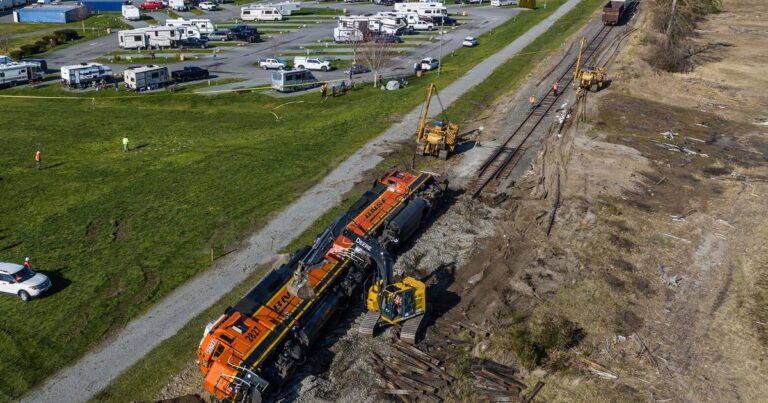U.S. District Judge Robert Lasnick on Monday ordered BNSF to pay just under $400 million to the Swinomish Indian tribal community for trespassing on reservation land.
BNSF has operated the rail line through the reservation under a 1991 rights-of-way agreement that allows trains to carry only 25 cars per day in each direction and requires BNSF to tell the tribes “the nature and identity of all cargo” that crosses rights-of-way stretches less than a mile in length.
Last year, Judge Lasnick ruled that BNSF knowingly, knowingly and willfully trespassed when it operated about 250,000 railcars loaded with crude oil over the Swinomish Reservation beyond the limits of its treaty with the tribe. BNSF was transporting the crude oil trains through the Swinomish Reservation to nearby oil refineries.
In a four-day bench trial that began earlier this month, BNSF must show what percentage of its revenues from transporting crude oil it would have earned without violating the easement agreement. BNSF and Swinomish each provided experts to testify about how the judge should calculate BNSF’s share of “ill-gotten” profits.
Witnesses agreed on the number of cars that had been trespassed (266,877), and that the revenue those cars generated was about $900 million. Swinomish and BNSF ultimately disagreed on how much the court should order Swinomish to pay.
Lasnick calculated that BNSF owes about $362 million for the trespass, plus another $32 million in after-tax gains such as investment income, for a total liability of about $395 million.
The ruling stems from a 2015 lawsuit in which BNSF allegedly used its trackage rights to operate six 100-car trains a week, four times the number of cars allowed under the easement agreement.
A BNSF spokesman declined to comment on the ruling.
The history of this railway is full of ups and downs.
In 1889, a predecessor to BNSF built an illegal railroad through the Swinomish Reservation. The tribe opposed it, and court documents say the railroad failed to get permission under treaty or congressional statute before completing it.
The railroad had been using the tracks without permission for decades, but in 1970 the Swinomish Indian Tribal Community again opposed the move. The tribes and the railroad were unable to reach an agreement, and in 1977 the tribes asked the United States to file a lawsuit against the railroad for trespass and track removal.
That fall, the railroad’s right-of-way application was denied by the federal Bureau of Indian Affairs because it did not have the tribe’s consent. The tribe and BNSF entered into an easement agreement in 1991.
The railroad crosses sensitive marine ecosystems, including a drawbridge over Swinomish Strait and a trestle bridge across Padilla Bay within the reservation. These waters connect with other bodies of water in the Salish Sea and where tribes have treaty-protected fishing rights.
In 2020 testimony, Swinomish Tribe Sen. Jeremy “JJ” Wilbur said the tribe fishes “every fish the Salish Sea has to offer” in its fishing grounds.
“I also worry that one day there could be a rail car accident in Swinomish Strait. That could be the worst case scenario,” he said, “That being said, it could be tragic not only for me and my livelihood and my family, but for many families here in Swinomish.”
Swinomish first learned through Skagit County planning documents that a nearby refinery, now Marathon, would begin accepting crude-oil trains in 2011. It wasn’t until the following year that Swinomish received a letter from BNSF specifically addressing the current use of the tracks, according to court documents.
Although the tribes and BNSF had begun discussions about amending the easement agreement, “at no time did the tribes approve BNSF’s unilateral decision to transport unit trains across the reservation, did not consent to increased train or car limits, and did not waive its contractual approval rights,” Judge Lasnick wrote in his 2023 ruling.
Meanwhile, 100-car trains transporting crude oil from the Bakken formation in and around North Dakota continued to run through the reservation. The trespassing continued from 2012 to 2021.
Bakken crude, a type of crude that is easily refined into fuel sold at gas stations, is prone to catching fire. Federal agencies warned in 2014 that the crude is more volatile than other U.S. crudes after tanker trucks carrying Bakken crude exploded in Alabama, North Dakota and Quebec.
Just days before the first phase of Swinomish v. BNSF’s civil trial is scheduled to begin in 2023, two BNSF locomotives derailed on Swinomish property on March 16, spilling an estimated 3,100 gallons of diesel fuel near Padilla Bay.
The tracks would take the trains just a few hundred feet from the tribe’s economic assets, including casinos, hotels and restaurants.
All of Washington state’s oil refineries are located on or near tribal reservations.

